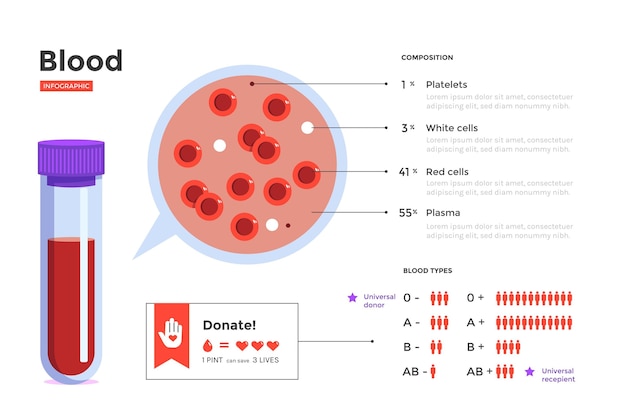A- Blood Type Facts

People with A- blood type are considered universal plasma donors.
A- blood type is relatively rare, accounting for only about 6% of the population.
A person with A- blood type can receive blood transfusions from A-, A+, and O- donors.
A- individuals have a higher likelihood of developing stomach cancer compared to other blood types.
A- blood type is often associated with higher levels of anxiety and stress.
People with A- blood type may have a higher risk of developing pancreatic cancer.
A- individuals tend to have a lower risk of developing heart disease.
A- blood type has been linked to a higher susceptibility to developing certain autoimmune disorders.
A- individuals may have a higher likelihood of experiencing fertility issues.
People with A- blood type often have lower levels of blood clotting factors.
A- individuals are more prone to experiencing allergic reactions compared to other blood types.
People with A- blood type have been found to have higher levels of von Willebrand factor, a protein involved in blood clotting.
A- individuals tend to have a higher risk of developing gallstones.
People with A- blood type may have a higher susceptibility to certain viral infections.
A- individuals have a lower risk of developing cognitive decline and dementia.
People with A- blood type are more likely to have higher levels of cortisol, the stress hormone.
A- blood type is associated with a higher risk of developing asthma.
A- Blood Type Facts part 2
A- individuals may have a lower risk of developing certain types of kidney disease.
A- blood type has been linked to a higher likelihood of developing multiple sclerosis.
People with A- blood type often have higher levels of homocysteine, which can increase the risk of cardiovascular disease.
A- individuals may have a higher susceptibility to developing rheumatoid arthritis.
A- blood type has been associated with a higher risk of developing certain types of leukemia.
People with A- blood type may have a higher likelihood of developing respiratory infections.
A- individuals may experience higher levels of inflammation within the body.
A- blood type is often associated with a higher risk of developing type 1 diabetes.
People with A- blood type may have a higher risk of developing blood clots.
A- individuals have a lower risk of developing gastric ulcers.
People with A- blood type may have a higher likelihood of developing food sensitivities.
A- blood type is often associated with a higher susceptibility to seasonal allergies.
A- individuals may have a higher risk of developing hay fever.
People with A- blood type are more prone to experiencing migraines.
A- blood type has been linked to a higher risk of developing certain skin conditions, such as eczema.
A- individuals may have a lower risk of developing certain types of thyroid disorders.
People with A- blood type are often more sensitive to certain medications and their side effects.
A- blood type has been associated with a higher likelihood of developing certain gastrointestinal disorders.
A- individuals may have a higher risk of developing age-related macular degeneration.
People with A- blood type tend to have higher levels of dopamine, a neurotransmitter associated with motivation and reward.
A- blood type has been linked to a higher risk of developing osteoporosis.
A- individuals have a lower risk of developing certain types of skin cancer.
People with A- blood type may have a higher susceptibility to developing autoimmune thyroid disorders.
A- blood type is often associated with a higher likelihood of developing celiac disease.
A- individuals may have a higher risk of developing glaucoma.
People with A- blood type tend to have higher levels of serotonin, a neurotransmitter associated with mood regulation.
A- blood type has been linked to a higher risk of developing certain mental health conditions, such as depression and anxiety disorders.
A- individuals may have a lower risk of developing certain types of lung cancer.